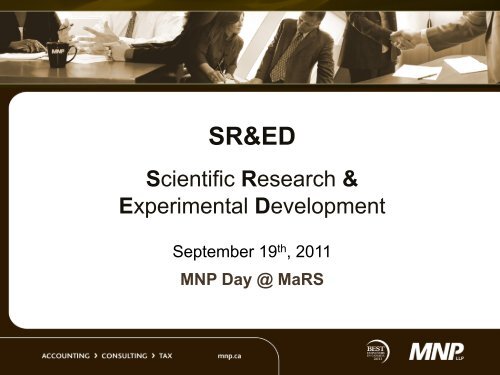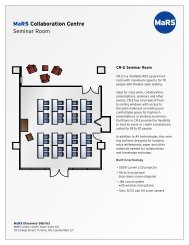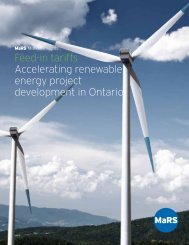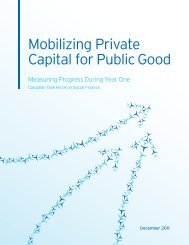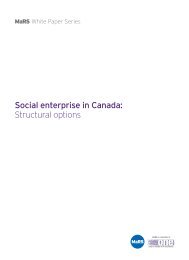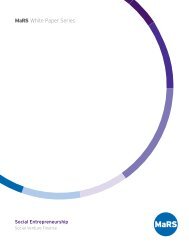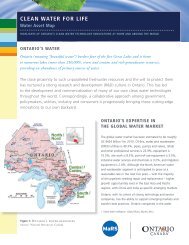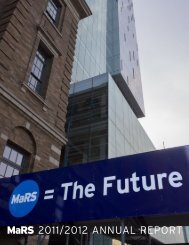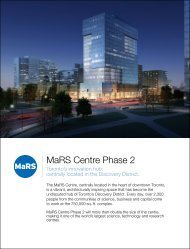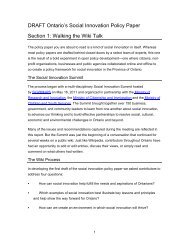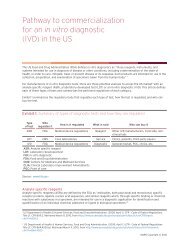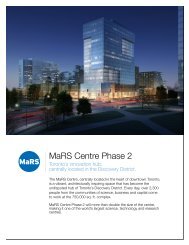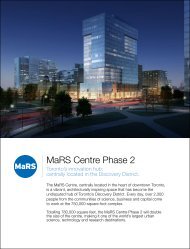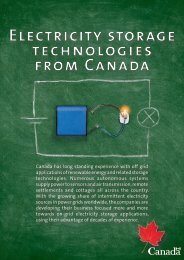SR&ED;
SR&ED;
SR&ED;
Create successful ePaper yourself
Turn your PDF publications into a flip-book with our unique Google optimized e-Paper software.
SR&<strong>ED</strong><br />
Scientific Research &<br />
Experimental Development<br />
September 19 th , 2011<br />
MNP Day @ MaRS
SR&<strong>ED</strong>: Topics for Today<br />
What is it?<br />
How can it help me/my business?<br />
What are the details?<br />
What are the pitfalls / caveats?<br />
How do I make a claim?
The SR&<strong>ED</strong> Program<br />
What is the SR&<strong>ED</strong><br />
Tax Credit Program?
SR&<strong>ED</strong> 101<br />
§ A good “four-letter” word<br />
§ Federal & provincial government program<br />
§ Tax credits for trying to overcome difficult<br />
development problems or to advance science<br />
§ Financial assistance for companies who perform<br />
specialized R&D activities in Canada<br />
ü In 2010, claimants received more than $5<br />
billion in Investment Tax Credits (ITCs)
SR&<strong>ED</strong> 101<br />
§ Work claimed must be related to resolving<br />
technical problems or advancing knowledge of<br />
scientific principles<br />
§ Claim the costs associated with the eligible work<br />
§ Work and costs claimed must satisfy eligibility<br />
criteria of the Program
SR&<strong>ED</strong> 101<br />
§ Tax credits calculated as a percentage of<br />
qualified expenditures<br />
§ File your claim within 18 months following the<br />
fiscal year-end of the year in which the research<br />
expenditures were incurred<br />
§ Most provinces have provincial credits available<br />
on top of the federal credits
The SR&<strong>ED</strong> Program<br />
How Can it Help<br />
Me / My Business?
The SR&<strong>ED</strong> Incentive…<br />
ü Reduces Your Corporate Income Tax Now!<br />
• Deduct your current & capital SR&<strong>ED</strong> expenses<br />
ü Reduce Your Future Income Tax!<br />
• Carry forward your SR&<strong>ED</strong> expenses!<br />
ü Get SR&<strong>ED</strong> Investment Tax Credits (ITC)<br />
• Sometimes get a cash refund or reduce taxes payable!<br />
• Carry forward ITC for 20 years or carry back for 3 years
What’s a SR&<strong>ED</strong> Claim Worth?<br />
If I spend $100,000 on R&D, what<br />
benefit is the SR&<strong>ED</strong> program?<br />
Here is an example….<br />
Tax Rate 15.5%<br />
After Tax Cost of $100,000 of SR&<strong>ED</strong> $47,220<br />
After Tax Cost of $100,000 of Expenses $84,500<br />
Net After Tax Benefit $37,280<br />
Criteria:<br />
ü Ontario-based CCPC<br />
ü Taxable income < $500,000<br />
ü $3,000,000 limit of qualified expenditures
The $ Bottom Line….<br />
Per $100,000 Eligible R&D Investment:<br />
q Private Company (CCPC)<br />
§ 35% refundable ITC & Ontario credits<br />
ü $37,280 net tax savings (CCPC)<br />
q Other Companies, Partnerships, Individuals<br />
§ 20% non-refundable ITC & ORDTC credit<br />
ü $16,930 net tax savings (not CCPC)
The SR&<strong>ED</strong> Program<br />
What Are the Details?
Definition of a SR&<strong>ED</strong> Project<br />
“<br />
…a set of interrelated activities (including<br />
support work) that…are necessary…to achieve the<br />
specific scientific or technological advancement<br />
defined in the project and are pursued through a<br />
systematic investigation…by means of experiment<br />
”<br />
or analysis…performed by qualified individuals.
Indicators of SR&<strong>ED</strong><br />
Typical SR&<strong>ED</strong><br />
Unknown outcomes<br />
Experimental,<br />
uses scientific method<br />
New concepts<br />
Creates new knowledge / abilities<br />
Solves unusual problems<br />
Seeks new knowledge<br />
Typical non-SR&<strong>ED</strong><br />
Predictable outcomes<br />
Troubleshooting, trial & error,<br />
optimization of known parameters<br />
Known concepts<br />
Accesses existing<br />
knowledge / abilities<br />
Solves typical / routine problems<br />
Uses existing knowledge
Two Types of SR&<strong>ED</strong> Projects<br />
Scientific Research<br />
Basic Research or<br />
Applied Research<br />
Advance knowledge of<br />
scientific principles<br />
Typically done through<br />
experimentation and analysis<br />
Experimental Development<br />
Seek technological advancement of a<br />
product, material, device or process<br />
No known solution to technical problem<br />
Done through systematic investigation<br />
and experimentation
When is your Scientific Research Project<br />
considered a SR&<strong>ED</strong> Project?<br />
Two (2) Important Criteria:<br />
1. You try to gain new scientific knowledge<br />
2. You document the work performed in the tax year<br />
Scientific Research<br />
Basic<br />
Research<br />
Applied<br />
Research
Scientific Research Projects<br />
1. You must try to advance Scientific Knowledge<br />
§<br />
§<br />
§<br />
Document the scientific knowledge that you gained or<br />
were attempting to gain<br />
Describe how the new knowledge is an advance relative to<br />
the scientific knowledge at the outset of the project<br />
Describe the scientific method used and how your<br />
experimentation advanced the understanding of scientific<br />
principles
Scientific Research Projects<br />
2. You must document the Work Performed<br />
§ Document the work (experimentation) performed during<br />
the year<br />
§ Describe the inadequacies of the existing scientific<br />
knowledge<br />
§ Articulate how your conclusions and analysis relate to<br />
the scientific knowledge you were attempting to gain
When is your Experimental Development<br />
Project considered a SR&<strong>ED</strong> Project?<br />
Three (3) Important Criteria:<br />
1. You must try to advance the underlying technology<br />
2. You must overcome technological obstacles that cannot<br />
be resolved using known techniques<br />
3. You perform work, during the tax year, to overcome<br />
technological obstacles, including experiments required<br />
to resolve the technological challenges and support<br />
work commensurate with conducting the experiments
Experimental Development Projects<br />
1. Try to Advance the Underlying Technology<br />
§ Describe the technological objective of the project, or the<br />
new or improved capability of the technology being used<br />
§ Describe how you advanced the current state of the art or<br />
technology base that existed at the onset of this project<br />
Please note that:<br />
• Success or failure to overcome technological obstacles is not a<br />
determinant for eligibility<br />
• Novelty or innovation is not sufficient to prove technological<br />
advancement
Experimental Development Projects<br />
2. Overcome Technological Obstacles<br />
§ Describe the shortcomings or limitations of the current<br />
technology that prevented you from developing the new<br />
or improved capability<br />
§ Detail the technological problems hindering the<br />
achievement of the technological advancement<br />
§ Illustrate the technology base at the onset of the project<br />
and why was it inadequate to overcome the<br />
technological problems encountered in attempting to<br />
reach your goals
Experimental Development Projects<br />
3. Describe the Work Performed in the Year<br />
§ Describe the work carried out during the tax year to overcome<br />
the shortcomings in the underlying technology<br />
§ Document the experiments performed and the analysis or<br />
conclusions made<br />
§ Detail the support activities required to achieve the<br />
technological advancement you sought
Support Activities Allowed in SR&<strong>ED</strong><br />
Work that directly supports and is commensurate with the<br />
needs of experimental development, applied research or basic<br />
research.<br />
Includes only the following 8 specific types of work:<br />
q Engineering<br />
q Computer Programming<br />
q Design<br />
q Data Collection<br />
q Operations Research<br />
q Testing<br />
q Mathematical Analysis<br />
q Psychological Research
What are SR&<strong>ED</strong> Eligible Expenses?<br />
q Labour Costs are Eligible !!<br />
ü Salaries? YES!!<br />
• Need a T4 slip<br />
û Dividends? No<br />
û Stock Options? No
Other Eligible Expenses<br />
ü Subcontractors / Consultants for R&D<br />
ü Materials consumed or transformed<br />
ü Equipment dedicated to SR&<strong>ED</strong><br />
ü Capital<br />
ü Lease Costs<br />
ü 3rd Party Payments to universities<br />
ü Overhead – traditional vs. proxy
Support Your Claim with Evidence<br />
ü Project planning documents<br />
ü Records of resources allocated to the project, time sheets<br />
ü Design of experiments<br />
ü Project records, laboratory notebooks<br />
ü Design, system architecture and source code<br />
ü Records of trial runs<br />
ü Progress reports, minutes of project meetings<br />
ü Test protocols, test data, analysis of test results, conclusions<br />
ü Photographs and videos<br />
ü Samples, prototypes, scrap or other artefacts<br />
ü Contracts
The SR&<strong>ED</strong> Program<br />
What Are the<br />
Pitfalls / Caveats?
Experimental Development Projects:<br />
Caveats and Pitfalls<br />
Eligibility Criteria:<br />
Only Technological Advances Allowed<br />
§ Business advances are not accepted<br />
Need to Resolve a Technological Uncertainty<br />
§ Must overcome a technological obstacle<br />
§ Must demonstrate that no solutions were available<br />
Technical Content<br />
§ Claimed staff must have technical competence<br />
§ Must demonstrate a systematic process of investigation<br />
§ Must demonstrate experimental development took place
Scientific Research Projects:<br />
Caveats and Pitfalls<br />
Work must be performed in Canada<br />
§ Document Canadian contribution in multi-national study<br />
Field market research not eligible<br />
§<br />
e.g. Obtaining market feedback on a new drug – not eligible<br />
Routine quality control not eligible<br />
§ e.g. Monitoring unexpected adverse reactions of a drug –<br />
not eligible<br />
No routine data collection for registries allowed
Scientific Research Projects:<br />
Caveats and Pitfalls<br />
Commercial production not allowed<br />
§ e.g. Commissioning a new manufacturing plant – not<br />
eligible<br />
No research in social sciences or humanities<br />
§ e.g. Study of bioethics – not eligible<br />
Intellectual property (patent) costs not eligible
Technical Project Description:<br />
Caveats and Pitfalls<br />
Part of the Tax Form<br />
§ Who is responsible for putting together the Claim?<br />
Limited Number of Words<br />
§ Sometimes not enough space to describe the work<br />
§ CRA mandates a certain format<br />
Who Writes the Technical Report?<br />
§ Few technical staff like writing reports, especially if they<br />
do not fully understand the eligibility criteria
Required Documentation:<br />
Caveats and Pitfalls<br />
Good Science – Bad Documentation<br />
§ CRA may deny or significantly reduce the claim if<br />
documents do not fully support the work done<br />
Documenting Technological Uncertainties<br />
§ Most people are unwilling to document how much they<br />
don’t know<br />
Documenting the Experiments<br />
§ Must be documented in a way that shows it goes<br />
beyond standard practice<br />
§ Must provide evidence of a systematic process
Must Pay a Wage!<br />
Tax Planning Slip-ups:<br />
Caveats and Pitfalls<br />
§ Especially to employees who are shareholders<br />
§ Possible even when cash flow is an issue<br />
Ensuring High Refundable Rates Maintained!<br />
§ Close monitoring of investment in the company to ensure<br />
that it doesn’t go offside structurally<br />
§ Managing taxable income<br />
§ Ineffective management of losses given SR&<strong>ED</strong> tools<br />
available
The SR&<strong>ED</strong> Review Process:<br />
Caveats and Pitfalls<br />
Once scheduled for a review, the claim is assigned<br />
to two different reviewers at CRA:<br />
§ Technical Reviewer: looks at whether projects meet<br />
technical eligibility criteria<br />
§ Financial Reviewer: looks at whether expenditures are<br />
valid<br />
Issues may be identified by managers of reviewers:<br />
§ More difficult to convince a reviewer when the issue is not<br />
theirs<br />
û Four sets of eyes will spot any small anomaly !
The Current SR&<strong>ED</strong> Environment:<br />
Caveats and Pitfalls<br />
At a recent event sponsored by the SR&<strong>ED</strong><br />
directorate of CRA some comments were made by<br />
CRA personnel:<br />
û They see an increase in taxpayers filing unsupportable<br />
and unjustified SR&<strong>ED</strong> claims<br />
û They find that taxpayers are unable to demonstrate the<br />
link between work performed and expenses claimed<br />
û They feel empowered to impose severe penalties when<br />
they feel fraudulent claims are filed (50% of tax credits<br />
claimed)
CRA Documentation Requirements<br />
CRA Technical Reviewers look for<br />
documentation that:<br />
ü Defines the scope of the SR&<strong>ED</strong> project<br />
ü Identifies the technological advancements you are trying<br />
to achieve<br />
ü Identifies technological obstacles encountered<br />
ü Describes the work that was performed during the year<br />
ü Sets out project start and end dates
CRA Documentation Requirements<br />
CRA Financial Reviewers look for:<br />
ü Activity-based time records<br />
ü Salaries – timesheets, payroll records, T4s<br />
ü Contract expenses – copies of contracts, invoices<br />
ü Material costs – invoices<br />
ü Overhead – if traditional method, invoices
The SR&<strong>ED</strong> Program<br />
How Do I Apply?
Applying for SR&<strong>ED</strong><br />
Preparation<br />
§ 1 technical report for each SR&<strong>ED</strong> project being claimed<br />
§ Identify costs associated with each SR&<strong>ED</strong> project being<br />
claimed<br />
Form T661<br />
§ Fill in the financial details of costs being claimed<br />
§ Fill in technical details of SR&<strong>ED</strong> projects being claimed<br />
T2 Corporate Tax Return<br />
§ T661 is part of the corporate tax return<br />
§ Must be adjusted for T661 numbers if not filed yet<br />
§ Must be amended for T661 numbers if already filed
MNP: Experience and Know-How<br />
ü Every SR&<strong>ED</strong> Claim is unique to the client!<br />
ü Speak with an MNP representative for details!<br />
ü Dedicated MNP- SR&<strong>ED</strong> professionals serving MaRS<br />
• Technical professionals (with research experience!)<br />
ü IT/ CleanTech<br />
ü Healthcare / Life Science<br />
ü Medical Device<br />
ü Engineering<br />
• Accounting professionals (with multiple claim success!)
THANK YOU !
Your MNP Contacts @ MaRS<br />
Ryan Cressman<br />
Sr Manager – SR&<strong>ED</strong><br />
ryan.cressman@mnp.ca<br />
Andrew Pellizzari<br />
Manager – SR&<strong>ED</strong><br />
andrew.pellizzari@mnp.ca<br />
Robert (Bob) Sutton<br />
Sr Manager – SR&<strong>ED</strong><br />
robert.sutton@mnp.ca<br />
Jeffrey Sum<br />
Sr Manager – Small Business<br />
jeffrey.sum@mnp.ca<br />
Atin Gupta<br />
Technology Lead at MNP<br />
& MaRS Liaison<br />
atin.gupta@mnp.ca


